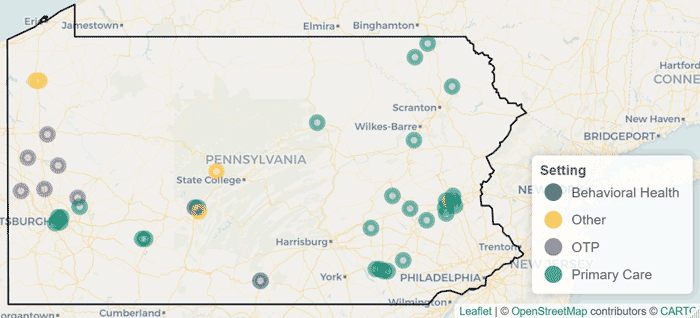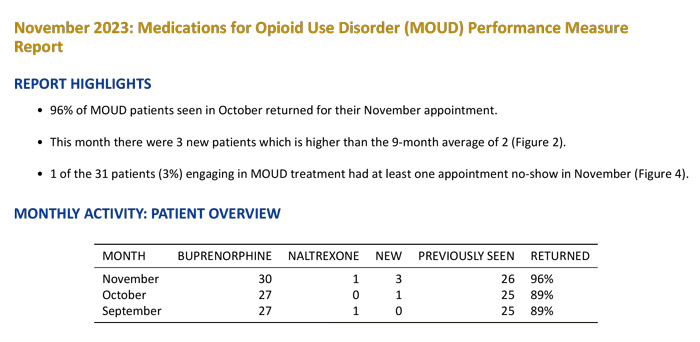The Pennsylvania Medications for Opioid Use Disorder (PA MOUD) Technical Assistance and Quality Improvement Expansion Project
- Need: To expand access to medications for opioid use disorder (MOUD) across the state of Pennsylvania.
- Intervention: An initiative formed to provide technical assistance aimed at improving MOUD treatment capacity and quality at healthcare sites across urban and rural Pennsylvania.
- Results: In 2023, 108 providers engaged with the program, treating a total of 5,185 individuals with MOUD. Currently, the program engages partners in 20 Pennsylvania counties – serving rural populations in Crawford, Schuylkill, Susquehanna, Butler, and Cambria counties.
Description
 The Pennsylvania Medications for Opioid
Use Disorder Technical Assistance and Quality Improvement
Expansion Project (PA MOUD Expansion) is a collaborative
effort between the Pennsylvania Department of Drug and
Alcohol Programs (PA-DDAP) and the University of
Pittsburgh School of Pharmacy Program Evaluation and
Research Unit (PERU) to improve treatment capacity and
quality within clinics providing medications for opioid
use disorder (MOUD).
The Pennsylvania Medications for Opioid
Use Disorder Technical Assistance and Quality Improvement
Expansion Project (PA MOUD Expansion) is a collaborative
effort between the Pennsylvania Department of Drug and
Alcohol Programs (PA-DDAP) and the University of
Pittsburgh School of Pharmacy Program Evaluation and
Research Unit (PERU) to improve treatment capacity and
quality within clinics providing medications for opioid
use disorder (MOUD).
The program began in 2016 with funding from the Agency for Healthcare Research and Quality (AHRQ) to expand MOUD access in rural Pennsylvania. The program now engages both urban and rural partners and is funded by the PA-DDAP.
PA MOUD Expansion currently partners with 15 Pennsylvania health systems, encompassing 42 healthcare sites. While most of these sites are primary care settings, the program has also worked with behavioral health providers and emergency departments. Currently, the program engages partners in 20 Pennsylvania counties – serving rural populations in Crawford, Schuylkill, Susquehanna, Butler, and Cambria counties.

In addition to PA-DDAP, key program partners include:
- Pennsylvania Department of Human Services
- University of Pittsburgh Medical Center Western Psychiatric Hospital
- PA Opioid Use Disorder Centers of Excellence
- PA Single County Authorities
Services offered
There are three main components to PA MOUD Expansion's work with their partners:
- Development of a MOUD implementation protocol, tailored to site-specific needs and capacity
- Implementation of an EHR-based continuous quality improvement process, tracking treatment initiation, engagement, and retention measures from month to month
- Foundational trainings on MOUD basics, motivational interviewing for providers, and stigma reduction – in addition to ongoing educational opportunities and a monthly newsletter
Program leadership meet regularly with a “site champion” within each partnering health system who are responsible for disseminating program information and protocols across their organization.
Results
In 2023, 108 providers engaged with the program, treating a total of 5,185 individuals with MOUD.
The figure below shows an excerpt from an anonymized monthly report issued to a rural partner site. The report notes a high rate of treatment retention from month to month among a group of 31 patients.

PA MOUD Expansion's monthly reports include site-specific information on:
- MOUD treatment initiation & engagement
- MOUD treatment retention
- MOUD treatment monitoring
- Buprenorphine dosing
- Prescriptions with primary MOUD provider
A summary of key informant interviews with program participants included the following partner comments:
- “I did the waiver training, and I've been working with Pitt-PERU, and that information has been really helpful for allowing me to prescribe.”
- “…I think one of the things that happens when you're building guidelines is that you get the buy-in from lots of different sectors of a health network. And that was really important for [name of physician group] practices to know that there were [name of physician group] policies and guidelines about MOUD.”
- “I think the knowledge of substance use disorders, particularly MOUD and the knowledge of different MOUD types certainly helps us in our assessments to maybe suggest that, to suggest that to individuals. I think that's definitely helped us because we're able to talk about the different forms of MOUD, the benefits it might have, the benefits of talking to a provider about it.”
- “The PERU trainings, especially on attitudes and perceptions, and especially for our team, the MOUD training specifically surrounding the pharmacology, that was definitely beneficial for us.”
Challenges
It has been challenging for some health systems to commit fully to the program due to multiple competing issues and priorities. Underlying stigma amongst leadership or providers can also contribute to a lack of organizational commitment.
Stigma related to MOUD may be heightened in some rural communities, which may discourage patients from seeking treatment — or complicate treatment for patients who do engage. Program leadership note that some rural providers are not up to date on MOUD policy and waiver requirements, and some rural pharmacies do not dispense MOUD. Lack of transportation is an additional barrier to MOUD treatment access for many rural patients.
Replication
It is essential to build and maintain strong relationships with partners. Be prepared to encounter stigma and respond in a way that does not lead to defensiveness.
Keep in mind that the timeline for program implementation will look different from site to site, so flexibility is key. Varying EHR systems and technological limitations can lead to a slower implementation process for some sites. In the case of technological road bumps, move forward with trainings and educational offerings to maintain program momentum.
The following resources may be useful to organizations interested in replicating the PA MOUD Expansion program model:
- Pennsylvania Medications for Opioid Use Disorder Technical Assistance and Quality Improvement Expansion Project Overview offers a detailed description of program stages, quality improvement process, training and education process, and MOUD implementation model.
- MOUD Performance Measure Reports: A Guide for Developing and Implementing MOUD Treatment Reports to Evaluate Treatment Quality offers an overview of program results and a protocol for implementing EHR-based MOUD performance measure reporting.
Contact Information
Katie Wooten, MPH, MSW, Senior Program Implementation SpecialistProgram Evaluation and Research Unit (PERU), University of Pittsburgh School of Pharmacy
PA MOUD Expansion Project
KEW180@pitt.edu
Topics
Access
· Health information technology
· Healthcare quality
· Primary care
· Stigma
· Substance use and misuse
States served
Pennsylvania
Date added
June 21, 2024
Suggested citation: Rural Health Information Hub, 2024 . The Pennsylvania Medications for Opioid Use Disorder (PA MOUD) Technical Assistance and Quality Improvement Expansion Project [online]. Rural Health Information Hub. Available at: https://www.ruralhealthinfo.org/project-examples/1139 [Accessed 16 February 2026]
Please contact the models and innovations contact directly for the most complete and current information about this program. Summaries of models and innovations are provided by RHIhub for your convenience. The programs described are not endorsed by RHIhub or by the Federal Office of Rural Health Policy. Each rural community should consider whether a particular project or approach is a good match for their community’s needs and capacity. While it is sometimes possible to adapt program components to match your resources, keep in mind that changes to the program design may impact results.
